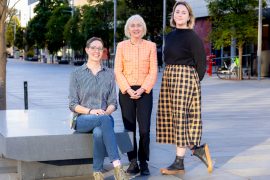
What is HEA Fellowship and why should I apply for one?
Fellowships of the Higher Education Academy (HEA) provide professional recognition for contributions to university teaching and learning. Fellowships of the HEA come in four different categories (Associate Fellow, Fellow, Senior Fellow and Principal Fellow) and develop and recognise excellence as defined through the UK Professional Standards Framework – an internationally recognised framework for benchmarking success within higher education.
The University of Sydney currently has over 250 fellows, with participants heralding from all schools and faculties, so fellowship status not only recognises your existing contributions and experience but ties you into a vibrant community of educators. Writing your application forms a type of development in itself and, since fellowship is awarded by peers using a validated framework, fellowship status can be used as evidence in job or promotions applications.
Am I eligible for HEA fellowship status? If so, which category?
HEA fellowships recognise all contributions to teaching and learning within higher education. This not only includes the usual tutoring, lecturing and coordination work, but encompasses the “behind the scenes” contributions made by those working in areas such as educational design and curriculum management, as well as those involved in strategy and leadership. To find out what category of fellowship best reflects your current role and experience take AdvanceHE’s helpful online decision tool.
What are the key dates for round two submissions in 2019?
There will be opportunities to gain fellowship status in 2020, those interested in submitting an application this year will need to submit an EOI by 11th October (at the latest) with a view to submit a completed written application by midnight on the 30th October 2019.
STEP 1: Attend an information session
The information session is for applicants new to the fellowship process. It provides an overview of the SEFP and the pathways to fellowship. If you cannot attend the session in person you can join the session online using Zoom videoconferencing. The session will be recorded and uploaded to the SEFP Canvas site later.
- REGISTER: 27 September 2019 | 1.00 – 2.00pm | Fisher Library, Rooms 249-250
- REGISTER: 03 October 2019 | 12.00 – 1.00pm | Fisher Library, Rooms 249-250
STEP 2: Join the Canvas SEFP Community
The SEFP Canvas site houses all the resources and information required for writing and submitting your fellowship application. To register click on the following link:
STEP 3: Plan your writing time and that required to obtain support letters
“How much time does and application take?”. This is one of the most asked questions that the SEFP gets asked. The most honest response to this question is “how long is a piece of string?”, a response which is both true and unhelpful at the same time. Instead, median averages that discount the worst of procrastination can help by offering a rough estimate of the general level of commitment needed.
| Written Account of Professional Practice (APP) | Support Documents* | Approx. no. of hours writing | |
| AFHEA 1400wds | 2x Reference Letters | 16 | |
| FHEA 3000 – 3500wds | 2x Reference Letters | 25 | |
| SFHEA 6000 – 7000wds | 2x Reference Letters | 32 | |
| PFHEA 7000 – 7500wds | 3x Advocate statements
1x Record of Educational Impact |
40+ |
* Support documents take additional time to procure and are dependent on time and availability of the person writing them.
STEP 4: Submit an EOI by 11 October (AFHEA and FHEA applications for 2019 only)
If you have already started writing an application and are confident that you can procure two reference letters of support before the end of October then and/or feel you would be ready to submit an application for consideration at this year’s panels then complete an online expression of interest by midnight 11th October at via the SEFP Canvas site: https://canvas.sydney.edu.au/courses/15435/pages/sefp-s2-2019-eoi-form Please note that you must submit an EOI to be considered for fellowship. Applications that have not submitted an EOI will not be forwarded to the panel for assessment.
STEP 5: Develop your application through resources, mentorship opportunities and writing workshops
You will be supported in writing your fellowship application through online resources, writing workshops and mentorship opportunities from other HEA Fellows at the university. Writing workshops will be run throughout the month of October 2019 and are open to all applicants whether or not you intend to submit your application this year or next. It is expected that all applicants attend at least one writing workshop and receive review of their application from one University of Sydney mentor prior to making a submission.
STEP 6: Submit your application (Wed 30th October)
AFHEA and FHEA applications can be submitted to a Turnitin Dropbox on the SEFP Canvas site. Applications are then assessed by a panel of trained assessors in early November. If you are successful then fellowship status will be conferred early 2020. Should you receive a revise and resubmit then you will be given four weeks to resubmit your application, with panels meeting in 2020 to make a decision. If you are not ready to submit an application by this date then don’t worry as there will be more opportunities in 2020. EOIs for Senior Fellow (SFHEA) and Principal Fellow (PFHEA) will open early in 2020.
What happens after you’ve got fellowship?
Once you have obtained fellowship status you become part of a community of fellows at the university. Dependent on which category of fellowship you obtain you may also be able to train to be a mentor or assessor. This work counts towards both teaching and academic service and may be used as evidence for jobs, promotions, and future fellowship applications.
For more information
For more information contact: [email protected]
Enroll: https://canvas.sydney.edu.au/courses/15435
Fellowship decision tool: https://bit.ly/isHEAforme





